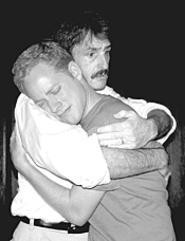"Oh, he just switched to business administration. He was majoring in animal husbandry, but they caught him at it one day."
Punch lines aside, the sexual union of man and beast is one of the darker byways of eros, a topic most civilized people steer clear of. And though self-proclaimed fundamentalist moralists may equate homosexual marriage with man-on-dog sex (see: U.S. Senator Rick Santorum), for most, "doggy style" merely describes a sexual position favored among humans.
In 2000, the esteemed and provocative playwright Edward Albee created a minor uproar with The Goat, or Who Is Sylvia?, a play that addresses this issue with a combination of absurdity, comedy, and Greek tragedy. Dobama Theatre, performing this season at the Cleveland Play House complex, is now presenting this fierce exploration of the limits of tolerance, the boundaries of love and betrayal, and the allure of sloe-eyed quadrupeds. While frequently witty and often hypnotically fascinating, the play is rife with contradictions and flaws. But it's elevated by Joel Hammer's pitch-perfect direction and one performance so shattering in its honesty, variety, and rage that it transcends the material.
Since both the title and the come-hither close-up photo on the Dobama program identify the object of affection in this work, it's not spilling a secret to mention that Martin, an über-successful architect and family man, has fallen in love with a female goat he named Sylvia. Moreover, this love has been consummated numerous times over the past six months, with Martin having established his own heavy-petting zoo in nearby farm country. This news seeps out during the first scene, with Martin playfully/seriously mentioning it to his wife, Stevie, to whom he's been happily married for 22 years. Stevie, appreciating what she perceives as nonsensical humor, jests, "I'll stop by the feed store!" as she leaves for a hair appointment.
But then Ross, an old friend who's a TV journalist, arrives to conduct a videotaped interview with Martin, the recent recipient of the Pritzker Prize. This prestigious architecture award was announced the week Martin turned 50, when he was also handed a contract to design a multibillion-dollar development. Having thus established Martin as king of the hill in his professional and personal life (Martin and Stevie have even come to terms with their 17-year-old son Billy's recently announced homosexuality), Albee pushes them all over the cliff by having Martin give Ross the details of l'affaire Sylvia.
As scene two begins, Stevie is standing in their stylish library, staring at Martin with slack-jawed incredulity. She knows, because a smarmy letter from Ross has informed her of Martin's barnyard escapades. Thus begins the most intense theatrical confrontation in recent memory, highlighted by the intelligent and beautifully nuanced performance of Tracee Patterson as Stevie. Somehow, Patterson keeps all her reactions credible in the face of this incomprehensible revelation. Swerving in sharp turns from piercing sarcasm to blind hatred to hapless confusion, Patterson smashes pottery and upends furniture without ever losing hold of her character's through line: her devotion to a marriage that has made her very happy. Until this day.
As Martin, Scott Miller has fewer notes to play, but he does a polished job of conveying a man trapped in a sexual obsession from which he can't, or won't, extricate himself. Still, Miller too often relies on bursts of anger (calling his son a "fucking faggot" at one point), rather than revealing the understandably strong ego that undergirds Martin's distracted demeanor. Charles Kartali is warm and affecting as Ross, but his task is sabotaged by the script, when Ross' reaction to Martin's confession moves almost immediately from cackling disbelief to damage control, bypassing about three stages of the comprehension process.
Albee's startling vision comes a cropper in the third and final scene, which is teeming with illogical motivations and ill-conceived resolutions. Young Billy (goat, get it?) suddenly decides to lean on old Dad for protection, even after being scathingly attacked earlier. Then, in the midst of a father-son hug, they kiss passionately but ever so briefly on the lips. Scott Esposito is a believable Billy, but one gets the feeling that Albee, having painted himself into a dramatic corner with the bestiality theme, decided to bust through the wall by introducing incest as well. Take that, prudish audience!
The denouement is as appalling as it is ridiculous, undermining the serious intentions that glimmer just below the surface. Albee lets himself and everyone else off the hook by having Stevie reenter with a deus ex machina wrapped in a scapegoat, all in one armful. But let's not make the perfect the enemy of the very good: This is a production -- and one performance, in particular -- that will stay with you, even if it does get your goat.


